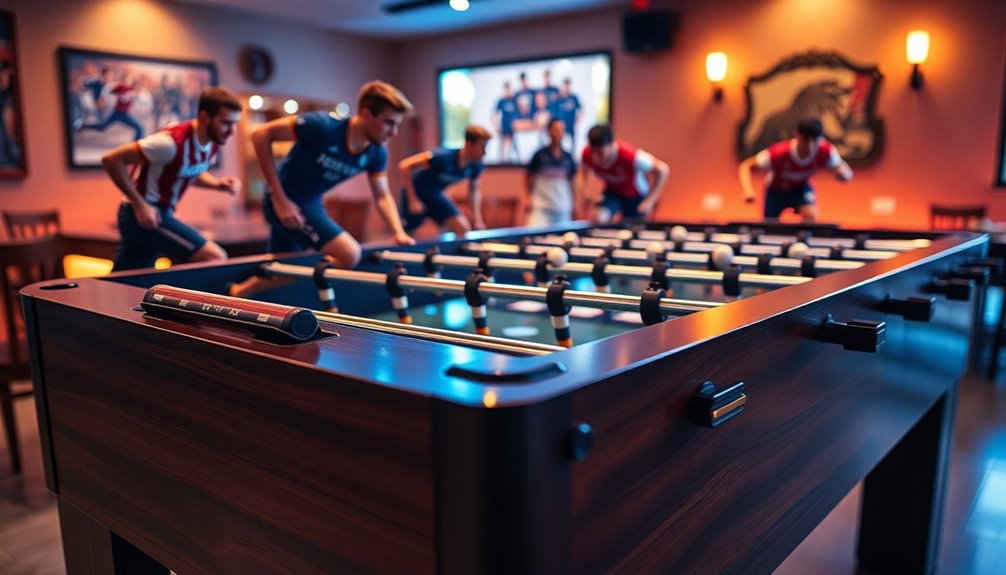Many arcade games, like claw machines, coin pushers, and the Key Master, are set up in a way that ensures minimal wins for players and maximum profits for operators. The chance of winning on claw machines can be as low as 1 in 18 tries, leading to frustration. Coin pushers can give the appearance of winning, but the payout rates are skewed in favor of the arcade. The Key Master game is infamous for requiring an average of 700 attempts to win, casting doubt on its fairness. If you want to learn more about these rigged games and their impact on your gaming experience, continue reading.
Key Takeaways
- Claw machines often have winning odds as low as 1 in 18 attempts, indicating a high likelihood of being rigged.
- Coin pushers are designed to limit player winnings while creating an illusion of potential success, maximizing operator profits.
- The Key Master game has faced allegations of requiring around 700 attempts to win, questioning its skill-based claims.
- Players experience manipulation of claw strength, reinforcing perceptions of rigging and leading to frustration and disappointment.
- Legal disputes over games like Key Master highlight the demand for transparency in arcade game mechanics to protect consumer rights.
Overview of Rigged Arcade Games
When you step into an arcade, it might feel like a world of fun and excitement, but many games are actually rigged to keep you from winning. Claw machines, for instance, are notorious rigged machines. The strength of the claw is often set randomly and usually isn't strong enough to secure a prize during most attempts. In fact, your odds of winning can be as low as 1 in 18, making it seem like a game of chance rather than skill.
This manipulation of odds is akin to how astrology claims to influence personality traits and attractiveness, suggesting that external factors can greatly impact experiences and perceptions.
Coin pushers are another example. Operators manipulate these machines to release a specific amount of cash or prizes, creating the illusion of potential wins. However, the overall payout rates are quite low, leading to player frustration.
The Key Master game, marketed as skill-based, has faced scrutiny too, with reports suggesting it takes an average of 700 attempts to win.
Arcade owners often adjust the settings on claw machines to guarantee you face a low chance of winning, typically aiming for a ratio of 1 in 12 attempts in California. This prioritization of profit over player success fosters skepticism about the fairness of these games, leaving you questioning whether you'll ever truly win.
Mechanics of Crane Machines

Crane machines operate on a blend of mechanical design and psychological manipulation, making them a staple in arcades. These rigged machines are designed to create an illusion of skill while actually favoring the house. When you play, you mightn't realize how the mechanics are stacked against you.
Understanding the financial implications of such entertainment choices is significant, especially for caregivers managing budgets for family outings or activities, as financial considerations for elderly care can impact overall expenses.
- The claw strength is often set to a low PSI—usually between 5 to 8—making it nearly impossible to lift the prizes you're targeting.
- Arcade operators frequently adjust settings to guarantee that players only win around 1 in 12 to 1 in 18 attempts, keeping the odds heavily in their favor.
- After a few uses, the claw's grip strength can weaken, further decreasing your chances of snagging that coveted prize.
Understanding these mechanics is crucial, especially for children who may not grasp the concept of rigged machines. The disappointment of losing can lead to frustration, making the experience less enjoyable.
Coin Pushers and Their Odds
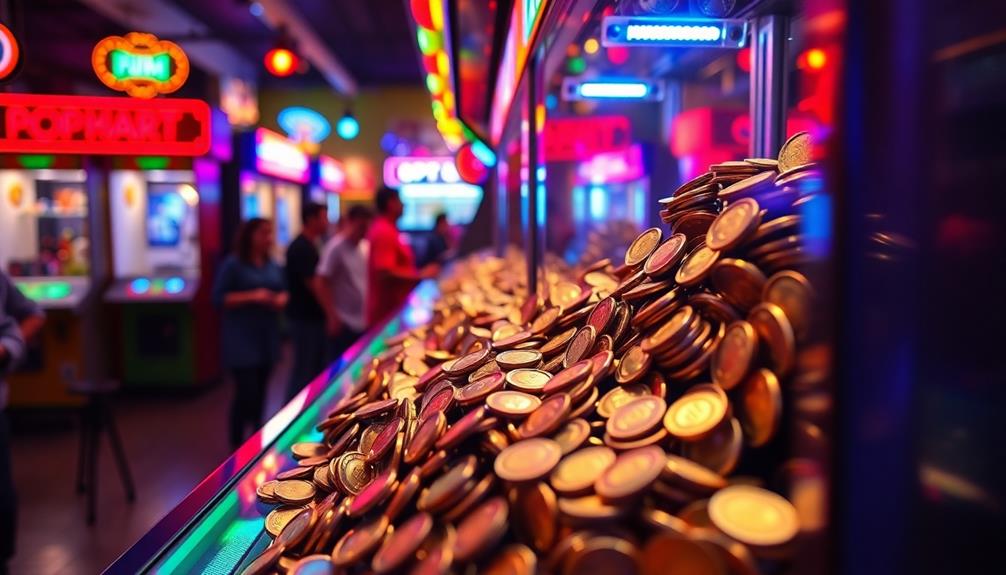
Although coin pushers might seem like a fun and simple way to win prizes, they're often rigged to favor the arcade operators. The odds of winning are manipulated, giving players a false perception of higher chances. You might find yourself dropping several coins into the machine, only to see minimal returns.
Here's a quick look at how coin pushers work:
| Aspect | Details |
|---|---|
| Payout Structure | Designed to favor the house |
| Coin Release | Limited number of coins pushed at once |
| Player Spending | Often exceeds actual winnings |
| Perceived Odds | Higher than the actual probability |
| Operator Profitability | Maximized through rigged designs |
The reality is that these rigged arcades set the stage for you to spend much more than you gain. Awareness of how coin pushers operate can greatly impact your gaming experience and trust in arcade games. So, next time you approach a coin pusher, remember that the odds are stacked against you.
The Controversy of Key Master
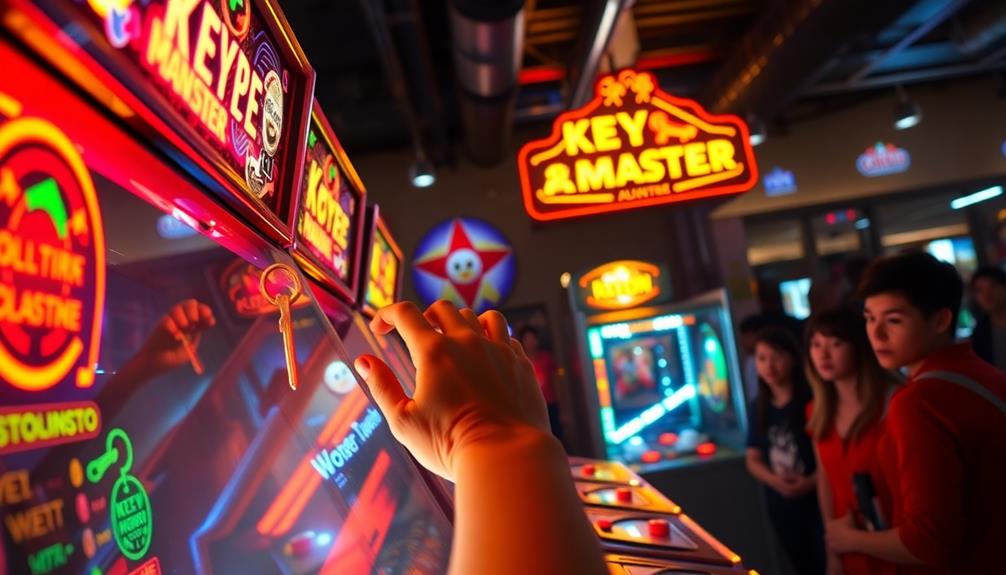
Coin pushers aren't the only arcade games raising eyebrows; the Key Master has also sparked significant controversy. Marketed as a skill-based machine, it's faced allegations of being rigged to guarantee players don't win until after a predetermined number of attempts—often reported as around 700 plays. This has led to a lawsuit filed by Marcelo Muto in California, accusing Sega of intentionally programming the machine to overshoot the keyhole.
Similar to how individuals with BPD experience intense emotional responses, players often feel a surge of excitement and frustration as they attempt to win.
Key Master's history includes:
- Ongoing scrutiny since 2013, with multiple class action lawsuits.
- Rebranding as Prize Locker, yet similar allegations remain.
- Legal arguments claiming it operates like a gambling device.
The controversies surrounding the Key Master highlight deceptive practices in arcade gaming. Despite its claims of skill, many players feel misled.
Legal representatives demand transparency in the game's mechanics to protect consumer rights against deceptive marketing. With ongoing discussions about the legitimacy of its skill-based nature, the Key Master continues to be a focal point in the debate over rigged arcade machines.
You might want to think twice before spending your hard-earned cash on this so-called skill game.
Skill vs. Chance in Arcades
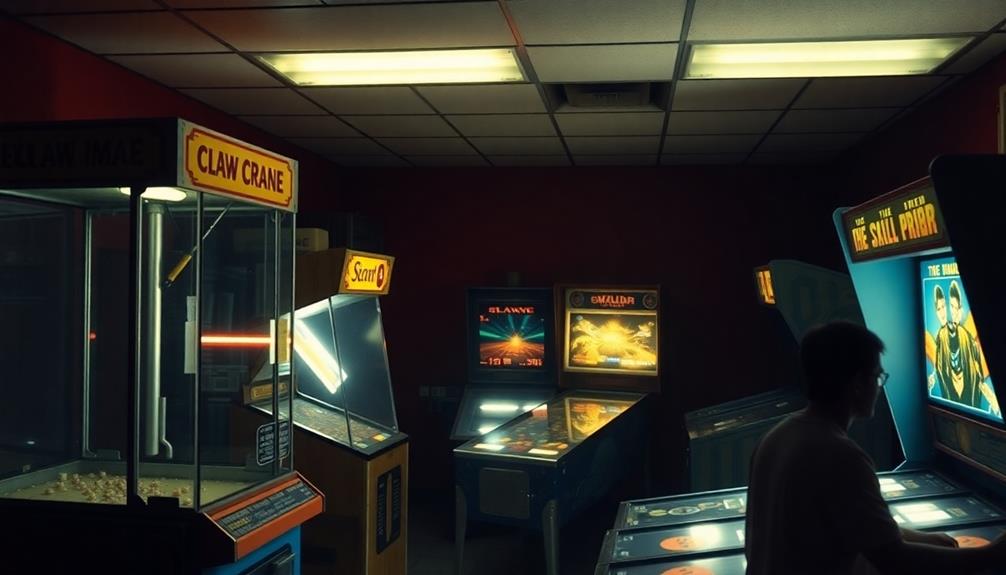
When you step into an arcade, it's easy to get caught up in the thrill of skill-based games, but many of these are actually driven by chance.
Understanding the concept of investment strategies can help you evaluate whether the time and money spent on these games yield any worthwhile returns.
Games like claw machines and coin pushers often stack the odds against you, making it tough to win despite your efforts.
This blend of chance and perceived skill can change how you experience the games, leaving you questioning whether it's worth your time and money.
Chance-Based Game Mechanics
In the world of arcade games, chance-based mechanics often overshadow actual skill, leaving players frustrated and questioning their odds. Many games, like claw machines, are designed to exploit this imbalance, making the chance of winning feel elusive. You might think you're getting better at these games, but the reality is often different.
Understanding the risks of these games is essential, much like recognizing the volatility in investments such as Bitcoin IRAs, where market dynamics can greatly impact outcomes risk management strategies.
- Crane game operators frequently manipulate claw strength, resulting in a win probability as low as 1 in 12 attempts.
- Claw machines often use insufficient grip pressure, so even if you snag a toy, it might slip away.
- In games like Key Master, you might find it's pre-programmed to block wins until you've spent a set number of attempts—some reports suggest it takes up to 700 tries!
Coin pushers also create a false sense of winning chances, as they release predetermined prizes that keep players hopeful while ensuring profits for operators.
As you navigate the arcade, remember that these chance-based game mechanics can lead to more frustration than fun. Recognizing the odds may not change your experience, but it can help you make smarter choices about where to invest your time and money.
Skill-Based Game Appeal
How do skill-based games manage to captivate players in a world filled with chance-based mechanics? Unlike claw machines, where outcomes are largely manipulated by operators, skill-based games like Fish Bowl Frenzy offer a more rewarding experience.
These games often feature advanced technology and interactive elements that enhance engagement, making them more appealing to a wider audience. When you play these games, you're not just relying on luck; you're using your skills to earn tickets that can be exchanged for prizes. This creates a perception that your ability directly impacts your success, making the experience feel more fulfilling.
The gaming industry, contributing around £2 billion annually to the UK economy, reflects a growing preference for skill-based games over traditional chance-based options. While claw machines might seem appealing at first glance, their low success rates—averaging 18 attempts for a win—often reveal the lack of genuine skill involvement.
Games that incorporate modern technology integration are increasingly popular, providing players with new challenges and experiences. As players, you're increasingly seeking games that truly test your abilities, and the industry is taking note.
With major arcade brands adopting fair play pledges, the shift towards ensuring skill influences outcomes is becoming more pronounced. This evolution enhances your gaming experience, making skill-based games the preferred choice for those who want to engage and succeed based on their talent.
Player Experience Perception
Perceptions of player experience in arcades often hinge on the distinction between skill and chance. While you might approach claw machines thinking your dexterity will lead to a win, the reality is often different. These games are primarily designed for chance, with operators manipulating claw strength to reduce winning rates considerably. This creates a misleading perception of skill and can lead to frustration.
Additionally, the design of arcade games often incorporates psychological elements that encourage players to continue trying, despite low odds of success, akin to the excitement found in high-quality pinball experiences like the ones in the best-rated pinball machines.
Here are some common misconceptions about player experience perception in arcades:
- Skill vs. Chance: Many players believe they can outsmart the game, but claw machines often operate on weak gripping forces, averaging just 5-8 PSI.
- Winning Odds: Statistics show you might need about 18 attempts to win a single prize, making success feel elusive.
- Rigged Gameplay: Other games like coin pushers and Key Master machines share similar low success rates, further eroding trust in the arcade experience.
This disconnect between expectation and reality contributes to a negative overall perception. As you navigate the arcade, keep in mind that the thrill of skill often masks the underlying chance that dictates your experience.
Impact on Player Experience
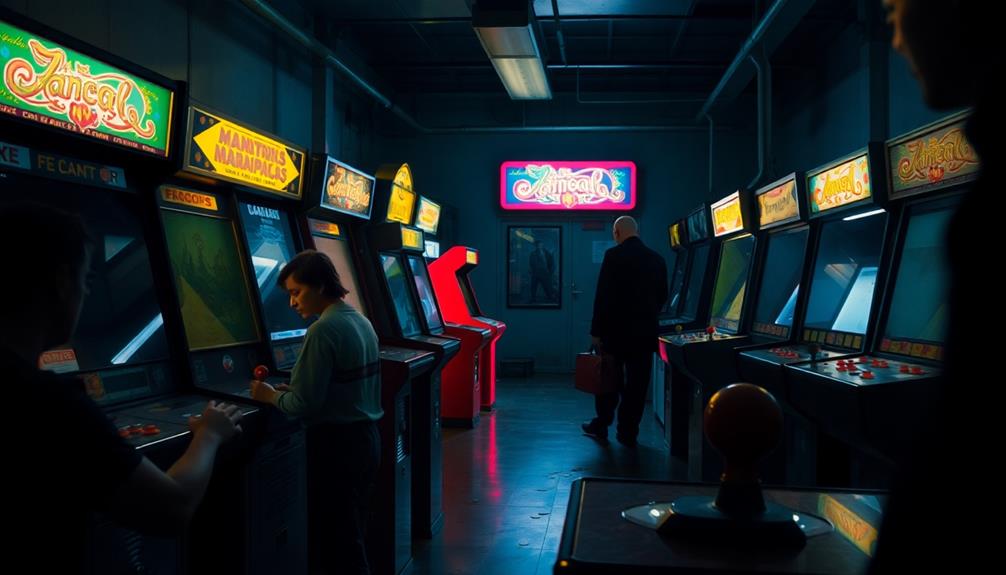
When you play arcade games that feel rigged, it often leads to emotional disappointment and frustration.
You might start questioning the fairness of these machines, which can erode your trust in the entire arcade experience.
This growing skepticism can make you think twice before spending your money on games that seem more like a gamble than a test of skill.
Emotional Disappointment and Frustration
The emotional disappointment and frustration players feel in rigged arcade games can greatly tarnish their overall experience. When you engage with claw games, you might find that despite your best efforts, success seems elusive. The thrill of the challenge quickly turns into disillusionment, especially when you realize that many players need around 18 attempts to win. This experience can mirror the frustrations seen in celebrity relationships, where the public often observes the emotional toll of repeated disappointments.
Celebrity relationship dynamics can sometimes leave fans feeling similarly disheartened. This manipulation of claw strength and payout settings leads to feelings of helplessness. It's even worse for children, who may not grasp the odds and become discouraged after repeated losses.
As a player, you might find yourself grappling with:
- A sense of unfairness when losses stack up, making you question the integrity of the game.
- Heightened emotional responses that transform joy into frustration after every unsuccessful grab.
- A diminished desire to return to arcades, as the excitement of gaming is overshadowed by negative experiences.
Ultimately, the emotional disappointment tied to rigged arcade games can rob you of the joy that gaming is meant to bring, leaving you hesitant to engage with these machines again.
Perceived Fairness and Trust
A sense of fairness plays an essential role in your enjoyment of arcade games, particularly claw machines. When you approach these machines, you expect a reasonable chance of winning, but many players perceive fairness as lacking. With statistics showing that it often takes around 18 attempts to snag a prize, it's no wonder you might feel skeptical.
The philosophical exploration of authenticity and existence suggests that our perceptions can greatly influence our experiences, making us question the integrity of these games existential themes.
The claw's strength is frequently manipulated to guarantee it applies insufficient pressure during most plays, reinforcing the belief that these games are rigged to maximize profits. This manipulation leads to a sense of distrust, as operators often adjust settings to limit payouts, making you question whether your efforts are in vain.
Repeated losses can create frustration and disappointment, diminishing your overall experience. When you see others win, you might wonder if it's a fluke or if the machine is genuinely fair.
Conversely, fair claw machines that allow for reasonable winning chances foster a more positive gaming atmosphere. When you perceive fairness in these games, your enjoyment increases, making you more likely to engage and return for another round.
It's clear that perceived fairness greatly impacts your trust and experience in arcade gaming.
Legal Battles and Consumer Rights

Numerous legal battles are unfolding around arcade games, particularly those like the Key Master machine that some claim are rigged against players. A proposed class action lawsuit against Sega and its affiliates seeks $5 million, alleging that the game is intentionally designed to favor the house by allowing wins only after numerous losses.
This raises serious questions about consumer rights and accountability in the arcade gaming industry. As players become increasingly aware of their rights, the importance of high-quality content and keyword optimization in informing them about these issues can't be overstated.
Key issues in these legal disputes include:
- Claims that the Key Master operates on chance rather than skill, undermining fair play.
- The default game setting reportedly requires players to make 700 attempts before securing a win.
- Advocates demand greater transparency, insisting that machines disclose their game mechanics as they resemble gambling devices.
Despite previous settlements, like the dismissed $650,000 proposal, the ongoing lack of response from Sega highlights significant gaps in consumer protection.
As these legal battles progress, it's clear that players deserve better clarity and fairness in the games they enjoy. You have the right to know how these machines operate and to challenge practices that seem misleading or unfair.
Future of Fair Play Standards

Arcade enthusiasts can look forward to a revitalized gaming experience with the introduction of new fair play standards. This initiative aims to guarantee that all arcade games, especially redemption games like claw machines and ticket-based games, can be won through skill rather than chance manipulation.
Major industry players, including Sega and Bandai Namco, support this fair play pledge, highlighting a commitment to transparency and integrity in game design and operation.
Operators will now be required to maintain consistent claw strength and game settings, preventing any manipulation of outcomes for profit. By emphasizing skill-based outcomes, the industry hopes to restore your trust and enhance engagement.
This could lead to a resurgence in arcade popularity, as players feel more confident that their skills will determine success, not rigged odds.
Ongoing monitoring and strict adherence to these fair play standards are expected to mitigate past practices of rigging games, ultimately benefiting both players and manufacturers.
As these changes take effect, you can expect a more enjoyable and trustworthy arcade experience, where fair play reigns supreme and your skills can shine.
Frequently Asked Questions
Are Arcade Claw Games Rigged?
You might wonder if arcade claw games are rigged. While they seem skill-based, the odds are often stacked against you. Many machines are programmed to give you a low chance of winning consistently.
Why Are Arcades Allowed to Rig Games?
Arcades can rig games due to state regulations that classify certain games as "games of chance." This allows operators to adjust odds and settings, prioritizing profit over fair play, often at your expense. Arcade game fairness is a major concern for consumers, as they may not be aware of the rigged nature of certain games. While some states have implemented stricter regulations and inspections to ensure fair play, there are still loopholes that allow operators to manipulate games. As a result, it’s important for consumers to be vigilant and cautious when playing arcade games, and to report any suspected rigging to the appropriate authorities. Consumers may also want to consider doing their own research and looking for reputable arcades with a reputation for fair gaming. Additionally, asking arcade staff about the fairness of specific games and being observant of any suspicious behavior can help protect against falling victim to rigged games. Ultimately, the question of “are arcade games rigged” highlights the importance of consumer awareness and advocacy for fair gaming practices in the arcade industry.
Are Arcade Key Machines Rigged?
When you play Key Master machines, you might notice they seem difficult to win on. Many players argue these machines are rigged, as they often require numerous attempts before any successful prize retrieval occurs.
Are Penny Falls Machines Fixed?
Yes, penny falls machines are often fixed. Operators adjust payout rates, making it seem like you can win, but the odds are stacked against you, requiring you to spend more than the prizes' actual value.
Conclusion
In the world of arcade games, it's all about the thrill and excitement, even if some machines play hard to get. While you might find yourself chasing that elusive prize, remember that every game has its quirks. Embrace the challenge, and don't let the odds deter your fun. With a bit of luck and a whole lot of determination, you can still enjoy the ride. After all, it's the journey that makes the game worth playing!

